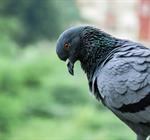
24 Feb 2025 | Apex Environmental Services (UK) Ltd
How to Get Rid of Crows: 5 Effective Ways
Crows are highly intelligent birds, but their presence on your property can quickly become a nuisance. Whether they’re raiding bins, scaring off other wildlife, or creating excessive noise, finding ways to deter them effectively is essential. If you’re struggling with a crow problem, here’s what you need to know.
Why Are Crows Attracted to Your Property?
Common Reasons for Crow Presence
Crows are opportunistic feeders, meaning they’ll take advantage of any available food sources. Rubbish bins, pet food, and open compost heaps can all attract them. They also seek out safe nesting spots, often choosing tall trees, rooftops, or sheltered areas near human activity. If your garden or outdoor space provides easy access to food and shelter, it’s likely to become a hotspot for crows.
Understanding Crow Behavior
Crows are social and highly adaptable. They communicate with each other, share food sources, and remember locations where they find easy meals. This means that once they’ve identified your property as a reliable place for food and shelter, they’ll keep returning. They’re also incredibly intelligent, making them difficult to scare away with basic tactics.
Effective Ways to Get Rid of Crows
Visual Deterrents
Crows are naturally wary of predators, so using visual deterrents can be an effective way to keep them away. Reflective objects, such as old CDs, aluminium foil, or specialist bird deterrent tape, can create flashes of light that disrupt their sense of security. Decoy predators like owl or hawk statues can also work, but they need to be moved regularly to prevent crows from realising they’re fake.
Sound-Based Deterrents
Loud noises can startle crows and make them think an area isn’t safe. Motion-activated devices that play distress calls or predator sounds can be useful. Wind chimes, air horns, or even banging pots together can also disrupt their presence, but consistency is key—if the noise is predictable, crows will quickly learn to ignore it.
Environmental Modifications
If crows see your property as an easy source of food, the simplest solution is to remove what’s attracting them. Keep bins tightly sealed, clean up fallen fruit from trees, and avoid leaving pet food outdoors. Trim tree branches to reduce potential nesting spots and use netting to protect vegetable patches. Making your garden less inviting is one of the most effective ways to deter them naturally. You can also consider using a home made bird repellent to add an extra layer of protection.
Physical Barriers
Installing an effective bird deterrent in UK gardens, such as anti-bird netting, can prevent crows from accessing key areas. Netting is particularly useful for protecting crops, roof spaces, and balconies. Spikes on ledges and fences can also discourage them from perching and roosting. Since crows are persistent, using multiple barriers in combination with other deterrents will give you the best results.
Natural Deterrents
Certain scents and tastes can repel crows. Spraying a homemade bird repellent made from vinegar, chilli, or citrus can make your property less appealing to them. Alternatively, planting strong-smelling herbs like rosemary, lavender, or mint may also help keep them at bay.
Mistakes to Avoid When Dealing with Crows

Using Deterrents Inconsistently
Crows are quick learners. If you only use deterrents occasionally, they’ll realise there’s no real threat and return. To be effective, deterrents need to be used consistently and in combination with other strategies.
Leaving Food or Water Sources Uncovered
It’s easy to overlook everyday items that might be attracting crows. Bird feeders, pet bowls, and even standing water can all encourage them to stay. Cover or remove these when possible to make your property less appealing.
Failing to Address Roosting Sites
Even if you scare crows away during the day, they may still return to sleep in nearby trees or rooftops. If you have a recurring problem, look for signs of nesting and take action early. Pruning trees or installing deterrents in potential roosting areas can prevent long-term issues.
Underestimating Their Intelligence
Crows are problem solvers. If one method isn’t working, they’ll quickly adapt and find a way around it. That’s why using a mix of strategies—rather than relying on just one—is the best way to keep them away.
When to Call a Professional?
If crows are causing significant damage or becoming aggressive, it may be time to call in an expert. Pest control specialists can assess the situation and recommend tailored solutions, such as professional netting or humane dispersal methods. If you’ve tried multiple deterrents and the problem persists, expert help can save you time and effort.
Final Thoughts
Getting rid of crows requires patience and a combination of methods. By removing food sources, using deterrents consistently, and making your property less inviting, you can effectively reduce their presence. If you need a long-term solution, installing physical barriers like netting may be the best approach. And if all else fails, a professional can help you find a tailored strategy. The key is to stay persistent—crows may be clever, but with the right tactics, you can outsmart them.


